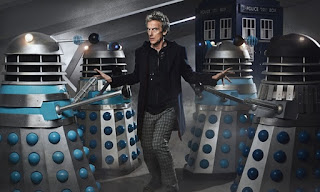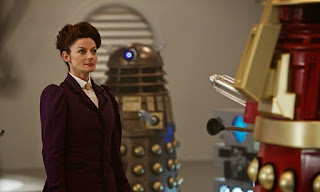"Clara Said "Don't Take Revenge." You Should Know I Don't Always Listen..."
Every now and then, certain programmes attempt to remind you
why you, as the viewer, readily choose to invest so much time and effort, both
mentally and/or physically, in such a programme in order to fuel such the
heavy, and sometimes rather unhealthy, addiction that has been created from
such dedication. In the case of Doctor
Who therefore, a programme in which I began watching as a young child, with
bundles upon bundles of Classic Who VHS’s keeping me company throughout my
younger years, it is a feat unparalleled when a show almost 53 years old can
keep on pulling out surprise after surprise, hit after hit, without every
feeling the need to slow down and say, “hey, we’re running out of ideas here.” Although
Series 9 has been a consistently strong and inventive addition to the Who canon thus far, this week’s episode
truly hit new sumptuous levels, with “Heaven Sent”, showing how our most
beloved of Sci-Fi shows has once again hit that high watermark, peaking in
similar brilliance to some of the best ever stories that have been told over
the past five decades with it ticking all the right boxes in what makes Doctor Who well, Doctor Who.
Acting as a straight-forward continuation from “Face the
Raven”, with our beloved Twelfth not having any time at all to grieve at the
loss of his loving companion, “Heaven Sent” immediately sets out its’
genre-bending tones in the first few scenes. Alone, lost, and completely out of
his depth, we witness The Doctor being menacingly stalked by a creature simply
known as The Veil, a manifestation of one of the Doctor’s memories in which he
witnessed a dead woman, still cloaked in her veil, being surrounded by a hoard
of death-mongering flies, with its’ full form slowly following our Doctor in
every step he takes throughout a clock-work maze, utilised and set up by some
form of unknown entity in order to gain the Doctor’s deepest confessions. Not
only does “Heaven Sent” fully ramp the horror element of Doctor Who up to eleven, with the presence of the Veil making me
jump on at least two occasions, it also manages to add an even deeper level to
the character of the Doctor, with the fear of death highlighting a more human
side to our favourite Time Lord whilst expanding on the very nature of the
Doctor’s escape from Gallifrey all those years ago, something of which has been
leaned upon ever since “The Magician’s Apprentice”.
Although in the past, Steven Moffat has been criticised by
many for introducing plot lines and stories that although look fun and mean
well, actually end up making no logical sense whatsoever, “Heaven Sent” shows
the brilliant side of Moffat, with its’ timey-wimey plot all coming clear in a
final act that ranks high amongst some of his best work for the show. Within the midst of the Inception-esque mind-bending science fiction and fabulous inventive
writing, is the performance from Peter
Capaldi, a performance that not only can be regarded as the best so far within
his tenure as the Twelfth Doctor, but one of the greatest in the series to this
date, with the Pertwee/Tom Baker hallmarks being fully embraced in an episode
that attempts to put our Doctor well and truly through the wringer in a similar
vein to the Fourth Doctor’s venture into the Matrix within “The Deadly
Assassin,” an episode in which our beloved Time-Lord is also companion-less and
also returns to his homeland of Gallifrey. The only negative thing to say about
“Heaven Sent” is that because of its’ sheer brilliance, next week’s “Hell Bent”
has so much to live up to, but for now, let us sway in the remarkable abilities
of both Capaldi and Moffat with “Heaven Sent” certainly earning the right to
earn a place in the hall of fame of great Who
stories. Roll on next week!
Overall Score: 10/10


























